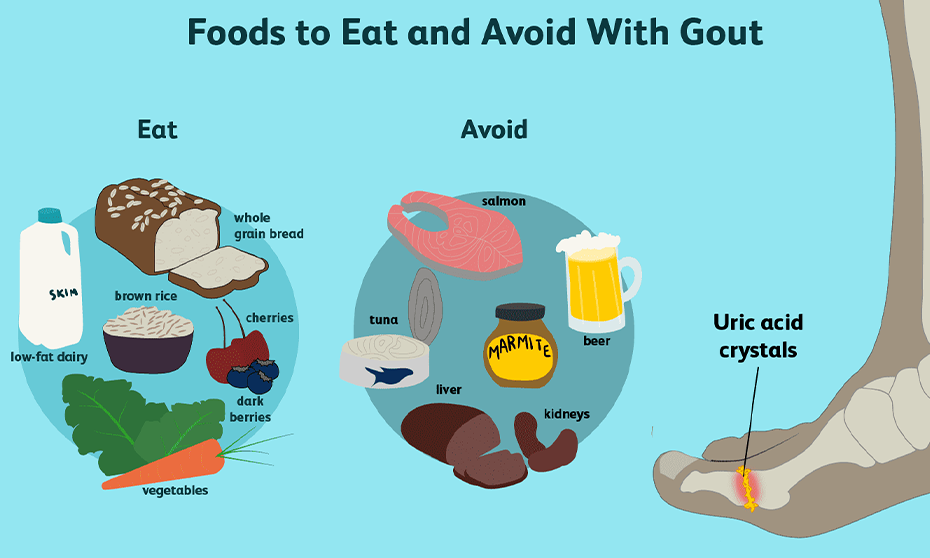Gout: Foods to Eat and Avoid
Gout is arthritis characterized by sudden and severe pain, redness, and joint swelling, often affecting the big toe. This painful condition is caused by an excess of uric acid in the bloodstream, which can form crystals in the joints. Managing diet along with timely homeopathic treatment plays a crucial role in controlling gout flare-ups. Here’s a guide on what foods to eat and what to avoid.
FOODS TO EAT
1. Low-Fat Dairy Products
Options like yogurt, milk, and cheese can help lower uric acid levels. They are also rich in protein, essential for maintaining muscle mass.
2. Fruits and Vegetables
● Cherries: Known for their anti-inflammatory properties, cherries can help reduce uric acid levels and lower the risk of gout attacks.
● Leafy Greens: Brazil nuts, eggs, and sunflower seeds are good sources.Spinach, kale, and broccoli are packed with vitamins and nutrients, offering numerous health benefits.
● Citrus Fruits: Oranges, lemons, and limes are high in vitamin C, which may help reduce uric acid levels.
3. Whole Grains
Foods like oatmeal, brown rice, and whole-grain bread are great sources of fiber and can help in maintaining a healthy weight.
4. Nuts and Seeds
Almonds, walnuts, and flaxseeds provide healthy fats and proteins without contributing to uric acid levels.
5. Lean Proteins
Opt for lean cuts of meat (like chicken and turkey) and fish, particularly fatty fish like salmon, which contain omega-3 fatty acids that can reduce inflammation.
6. Hydration
Drinking plenty of water helps to dilute uric acid and flush it from the body. Aim for at least 8-10 glasses a day.
FOODS TO AVOID
1. Red Meat and Organ Meats
Beef, lamb, and pork as well as organ meats like liver, kidney, and sweetbreads are high in purines, which can increase uric acid levels.
2. Certain Seafood
Shellfish such as shrimp, crab, and lobster as well as fish like sardines and mackerel can also contribute to elevated uric acid levels.
3. Sugary Beverages
Soft drinks and fruit juices that contain high fructose corn syrup can raise uric acid levels significantly.
4. Alcohol
Beer and liquor can inhibit the body’s ability to eliminate uric acid. If you drink, do so in moderation or consider abstaining altogether.
5. Processed Foods
Foods high in refined carbohydrates, such as white bread, pastries, and sugary snacks, can contribute to weight gain and increase the risk of gout flare-ups.
6. High-Purine Vegetables
While vegetables are generally good for health, some are moderately high in purines. It's best to consume them in moderation. Some examples of high-purine veggies are Asparagus, Cauliflower, Spinach, Mushrooms, Green peas, Dried lentils, peas, and beans, and Tomatoes.
Conclusion
Managing gout through diet involves making thoughtful choices to lower uric acid levels and reduce inflammation. Incorporating more fruits, vegetables, whole grains, and lean proteins while avoiding high-purine foods can help minimize flare-ups. Always consult a healthcare professional for personalized advice and treatment options, as dietary needs can vary among individuals. By making informed dietary choices, gout patients can lead healthier and more comfortable lives. While following this guideline one should keep taking Homeopathic medicines and it would not replace the need of the same also.
Dr. Greeva Mankad
Homeopathy Consultant,
Homeoeclinic

